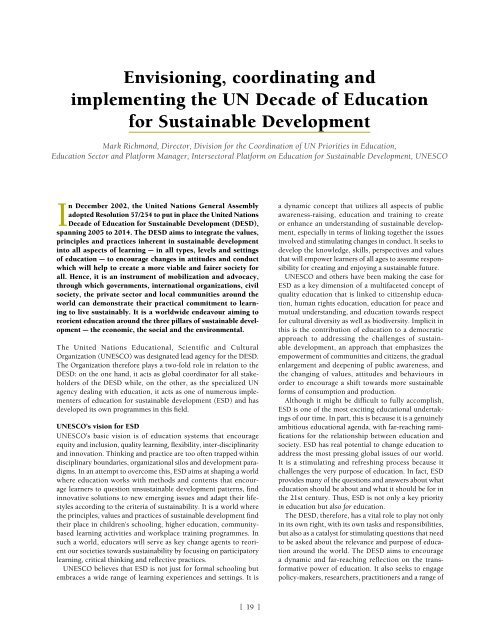Tomorrow today; 2010 - unesdoc - Unesco
Tomorrow today; 2010 - unesdoc - Unesco
Tomorrow today; 2010 - unesdoc - Unesco
Create successful ePaper yourself
Turn your PDF publications into a flip-book with our unique Google optimized e-Paper software.
Envisioning, coordinating andimplementing the UN Decade of Educationfor Sustainable DevelopmentMark Richmond, Director, Division for the Coordination of UN Priorities in Education,Education Sector and Platform Manager, Intersectoral Platform on Education for Sustainable Development, UNESCOIn December 2002, the United Nations General Assemblyadopted Resolution 57/254 to put in place the United NationsDecade of Education for Sustainable Development (DESD),spanning 2005 to 2014. The DESD aims to integrate the values,principles and practices inherent in sustainable developmentinto all aspects of learning – in all types, levels and settingsof education – to encourage changes in attitudes and conductwhich will help to create a more viable and fairer society forall. Hence, it is an instrument of mobilization and advocacy,through which governments, international organizations, civilsociety, the private sector and local communities around theworld can demonstrate their practical commitment to learningto live sustainably. It is a worldwide endeavour aiming toreorient education around the three pillars of sustainable development– the economic, the social and the environmental.The United Nations Educational, Scientific and CulturalOrganization (UNESCO) was designated lead agency for the DESD.The Organization therefore plays a two-fold role in relation to theDESD: on the one hand, it acts as global coordinator for all stakeholdersof the DESD while, on the other, as the specialized UNagency dealing with education, it acts as one of numerous implementersof education for sustainable development (ESD) and hasdeveloped its own programmes in this field.UNESCO’s vision for ESDUNESCO’s basic vision is of education systems that encourageequity and inclusion, quality learning, flexibility, inter-disciplinarityand innovation. Thinking and practice are too often trapped withindisciplinary boundaries, organizational silos and development paradigms.In an attempt to overcome this, ESD aims at shaping a worldwhere education works with methods and contents that encouragelearners to question unsustainable development patterns, findinnovative solutions to new emerging issues and adapt their lifestylesaccording to the criteria of sustainability. It is a world wherethe principles, values and practices of sustainable development findtheir place in children’s schooling, higher education, communitybasedlearning activities and workplace training programmes. Insuch a world, educators will serve as key change agents to reorientour societies towards sustainability by focusing on participatorylearning, critical thinking and reflective practices.UNESCO believes that ESD is not just for formal schooling butembraces a wide range of learning experiences and settings. It isa dynamic concept that utilizes all aspects of publicawareness-raising, education and training to createor enhance an understanding of sustainable development,especially in terms of linking together the issuesinvolved and stimulating changes in conduct. It seeks todevelop the knowledge, skills, perspectives and valuesthat will empower learners of all ages to assume responsibilityfor creating and enjoying a sustainable future.UNESCO and others have been making the case forESD as a key dimension of a multifaceted concept ofquality education that is linked to citizenship education,human rights education, education for peace andmutual understanding, and education towards respectfor cultural diversity as well as biodiversity. Implicit inthis is the contribution of education to a democraticapproach to addressing the challenges of sustainabledevelopment, an approach that emphasizes theempowerment of communities and citizens, the gradualenlargement and deepening of public awareness, andthe changing of values, attitudes and behaviours inorder to encourage a shift towards more sustainableforms of consumption and production.Although it might be difficult to fully accomplish,ESD is one of the most exciting educational undertakingsof our time. In part, this is because it is a genuinelyambitious educational agenda, with far-reaching ramificationsfor the relationship between education andsociety. ESD has real potential to change education toaddress the most pressing global issues of our world.It is a stimulating and refreshing process because itchallenges the very purpose of education. In fact, ESDprovides many of the questions and answers about whateducation should be about and what it should be for inthe 21st century. Thus, ESD is not only a key priorityin education but also for education.The DESD, therefore, has a vital role to play not onlyin its own right, with its own tasks and responsibilities,but also as a catalyst for stimulating questions that needto be asked about the relevance and purpose of educationaround the world. The DESD aims to encouragea dynamic and far-reaching reflection on the transformativepower of education. It also seeks to engagepolicy-makers, researchers, practitioners and a range of[ 19 ]

















